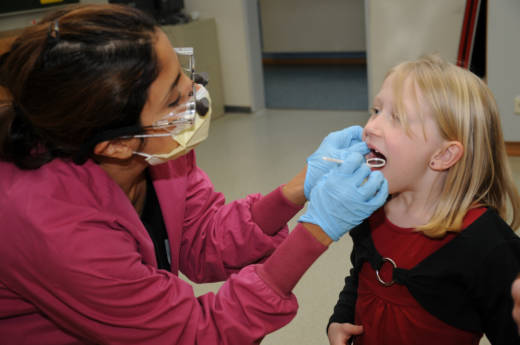Many dentists limit the number of Denti-Cal patients they see, or stop seeing them altogether because the pay is too low: California’s reimbursement rates are 35 percent of the national average.
The Republican bill, AB 15, would put all $200 million into paying dentists a better rate, in the hopes of attracting more dentists to participate in the program.
“We need to make it as efficient and effective as possible, so that millions of adults and kids in California that aren’t able to receive dental services are able to get them,” Mayes said.
But it's not clear that giving dentists more money actually results in more patients getting care.
The report from the Little Hoover Commission – a report Mayes and other Republicans cite frequently in defending their bill – includes 11 recommendations on how to fix Denti-Cal.
Not one of the recommendations involves increasing payments to dentists. In fact, the report calls across-the-board rate hikes a “costly” move that would result in attracting only “a few more Denti-Cal providers.”
Instead, the report recommends improving the Denti-Cal program by simplifying paperwork, focusing on less expensive prevention strategies (like having pediatricians teach patients about good oral hygiene), and establishing dental clinics inside schools or community centers in remote areas, so that patients can go to a centrally located place for care, rather than traveling 60 miles to a dentist’s office.
Senate Republican Leader Jean Fuller, who represents Kern County, acknowledged that the bill doesn’t address those recommendations.
“Yes, there are a lot of things that I would like to fix about the program. But I am not the majority party, unfortunately. I am not likely to get to adjust those,” she said. “There are 120,000 children in my district who are not getting the service. So my job is to fight for my children to get what I can."
Paying dentists more money is really about making dentists happy, says Jessica Levinson, a professor at Loyola Law School in Los Angeles.
“It’s certainly a Republican goal to be business friendly,” she said. “This proposal is actually a business-friendly, a professional-friendly proposal to try and say to a dentist, ‘You will get higher reimbursement rates and you will be able to serve poor clients.’”
Levinson says there could also be something else at play here: campaign money. The California Dental Association gives more to Democrats in the state, but compared to other similar interest groups, like the California Medical Association, the dental group gives more generously to Republicans.
When it comes to Californian candidates running for federal office, in the most recent election cycle, the Dental Association gave exclusively to the Republican party, according to campaign contribution data from Open Secrets. That's a complete turnaround from 25 years ago, when the Association gave only to Democrats running at that level.
"It’s obvious to me that state office holders in California would be well aware of the fact that the California Dental Association is spending a lot of money for Republican candidates on the federal level,” Levinson said, “So they may be hoping that that money will soon come their way.”
Republicans and Democrats both are always on the lookout for new sources of campaign money. Asked if the Dental Association’s shift in giving influenced the Republican bill, Assemblyman Chad Mayes said he wasn’t aware of the shift.
“Actually, I’m a bit offended by even asking the question, because we really, genuinely care about the people of California,” he said. “This is about fixing a broken governmental program.”
